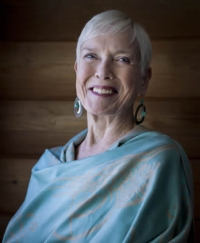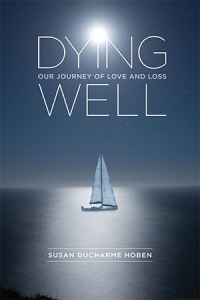blogpage
Articles
3 Secrets to Experiencing Joy With Your Loved One at Their End-of-Life
Aug 08, 2019 by Susan Ducharme Hoben
You don’t often see joy used in the same sentence as death. But when my husband Bruce was diagnosed with an aggressive stage 4 cancer, my family had to confront his impending death and in the process we found ways to surround him with friends, children, grandchildren, laughter, memories, love, and yes, joy. Here are 3 measures that can bring joy to what appears to be the most heart wrenching experience we can ever face.
Dying Well: 6 Obstacles to a Peaceful End-of-Life Experience
Jul 22, 2019 by Susan Ducharme Hoben
While most Americans prefer to die at home and have control over their healthcare decisions, this is not the case for many of us. Although 90% of those on Medicare say they want end-of-life care at home, only one-third achieve it. Far too many of us die in hospitals, in pain, isolated from friends and families, often after a long medical struggle with an incurable condition. Family members are left with heart-wrenching tales full of tears, anger, regret, and loneliness.
So what keeps us from dying well?
7 Ways to Move from Grief to Gratitude When Death Comes Calling
Jul 05, 2019 by Susan Ducharme Hoben
We may intellectually accept that death is normal and inevitable, but it doesn’t feel that way when it comes knocking on your door. My family was forced to come to grips with mortality when my husband Bruce was diagnosed with an aggressive stage 4 cancer. On Bruce’s journey I learned many powerful life-affirming lessons about finding gratitude in the face of death. Here are 7 lessons that can bring peace and even a sense of joy to what appears to be the most heart wrenching experience we can ever face.
5 Ways to Cope with Your Loved One’s Terminal Illness
Jul 01, 2019 by Susan Ducharme Hoben
If you or your loved one have not thought about or prepared for death, you may not know where to start when your loved one is faced with a terminal illness. I learned successful coping strategies when Bruce died. These 5 actions will help you feel more confident that you can handle the challenges ahead.
John McCain – A Profile in Courage In Life and in Death
Aug 27, 2018 by Susan Ducharme Hoben
Unlike John McCain, we as a society have not come to terms with dying as a natural part of living. Observing the words and actions of those dealing with a terminal prognosis, whether we know them personally or only as figures in the public spotlight, can be an emotionally powerful way to gain new insights. Fear prevents us from even thinking about death, let alone talking about it or planning for it. But the more we know about other people’s journeys, the less we will fear our own. Perhaps, with each new experience that is shared, we will become more comfortable with the inevitable.
Dying Well - The Gift We Gave Each Other
Jul 24, 2018 by Susan Ducharme Hoben
I gave my husband Bruce the gift of dying well, and although by definition a gift is something given without expectation of a return, the gift I got in return was as profound as the gift I gave. We gave each other what most people want at the end of life, a sense of completion. As I look back, I have never thought there was something I would or could have done differently.
Industry Voices—5 steps to ensure your patients—like my husband—receive the end-of-life care they want
Jul 24, 2018 by Susan Ducharme Hoben
People with terminal illnesses don’t die alone. As part of a team, physicians play a critical role in helping their patients make the right choices consistent with their goals. Here are five steps you can take to help your patients receive the end-of-life-care they want.
The Virginian Pilot Guest Columnist Susan Ducharme Hoben: Taking control of our final days
Jul 17, 2018 by Susan Ducharme Hoben
We as a society have not come to terms with dying as a natural part of living. Medical science has outstripped our ability to distinguish what can be done versus what should be done. This results in end-of-life care that is often aggressive, expensive and not in accordance with what patients want. Far too many of us die in hospitals, in pain, isolated from our friends and families. We all need to take control of our final days.
What we can learn from how Charles Krauthammer has chosen to die: Guest opinion
Jul 17, 2018 by Susan Ducharme Hoben
It's important for us to have role models for dying well. Observing the words and actions of those dealing with a terminal prognosis, whether we know them personally or only as figures in the public spotlight, can be an emotionally powerful way to gain new insights. Fear prevents us from even thinking about death, let alone talking about it or planning for it. The more we know about other people's end-of-life journeys the less we will fear our own and perhaps, with each new experience shared, we will become more comfortable with the inevitable.
Doctors' Roles in Better Outcomes, Lower Costs for Terminally Ill Patients
Jul 17, 2018 by Susan Ducharme Hoben
In death, as in life, there are choices we make that determine the quality of our existence. While we may not be able to control the cause of our death, there are decisions we make that determine whether or not we die well. Susan Ducharme Hoben is the author of the memoir Dying Well: Our Journey of Love and Loss. Recalling how she lost her husband to cancer — and the health care process that navigated him through his terminal diagnosis — she details the means by which physicians can correct errors in patient fulfillment and financial burden at the end of their lives.
Too many Americans fail to plan for end-of-life care
Jun 15, 2018 by Susan Ducharme Hoben
There are institutional changes required to improve end-of-life care, i.e., restructuring the U.S. payment system and policies to support palliative care provision and updating medical school curriculum to educate clinicians about end-of-life care. These are necessary components of a long-term solution but institutions are slow to change. In the meantime there are personal barriers to dying well, largely fueled by fear and lack of information, which can be addressed now.
What it Means to Die Well and Why You Must Care
May 16, 2018 by Susan Ducharme Hoben
What does it mean to “die well”? The simple answer is it means dying the way you want to. Of course that then leads to more complicated and thought-provoking questions: How do you want to die? And when is it time to start thinking about that?
Having The Conversation – Once Is Not Enough
Apr 02, 2018 by Susan Ducharme Hoben
Bruce’s decision to stop treatment was not as hard as one might expect. We had been talking about it in the abstract for months, even years. We had living wills and health care directives. We had reaffirmed them when I’d had open-heart surgery, again when Bruce was diagnosed. Now, when the abstract became real, we did not agonize over whether it was still what we wanted. Our end-of-life wishes had been formed over a lifetime of watching people die, and just as importantly, watching people live.

